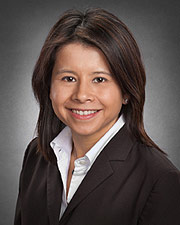Randomized, Double-Blind, Controlled Trial of Oral Antifungal for the Treatment of Fungal-sensitive Chronic Rhinosinusitis with Nasal Polyps

Amber Luong, MD, PhD
Amber U. Luong, MD, PhD, who is an assistant professor and director of research in the Department of Otolaryngology-Head and Neck Surgery at UTHealth Medical School, has earned a three-year $345,000 National Institutes of Health Clinical and Translational Science KL2 Program Award. In this study, Dr. Luong will conduct a clinical trial evaluating the role of an oral antifungal agent, itraconazole, in the postsurgical management of CRS with nasal polyps identified as fungal sensitive. The trial is based on preliminary data the clinician-scientist collected over two years in collaboration with Martin J. Citardi, MD, and Samer Fakhri, MD from the UTHealth Department of Otorhinolaryngology and David Corry, MD, from the Baylor College of Medicine Departments of Pathology and Immunology.
“From 40 to 70 percent of CRS patients with nasal polyps experience recurrent nasal polyps within one year after sinus surgery even with postoperative medical management, which includes an extended course of oral steroids, antibiotics and saline irrigations,” Dr. Luong says. “To date, we have no clear consensus on the appropriate postoperative treatment to minimize the recurrence. We hypothesize that this group of patients will show positive results in nasal polyp recurrence rates and health status assessment after postoperative treatment with itraconazole.”
Preliminary data analyzed by the researchers suggest that fungi plays a role at least in maintaining the T helper 2 (Th2) immune response characteristic of CRS with nasal polyps. Those data have resulted in the development by Drs. Corry and Luong of a sensitive in vitro assay for identifying fungal-sensitive CRS patients. Called the ELISpot assay, the test has a positive predictive value of 100 percent and a negative predictive value of 95 percent to identify the fungal-sensitive CRSwNP subgroup most likely to respond to oral antifungal therapy. Using this group of subjects, the new study will determine if the addition of a 24-week course of oral itraconazole after sinus surgery can prevent recurrence of nasal polyps and improve scores on health assessment questionnaires of CRSwNP patients with fungal reactivity and evidence of fungi within the diseased sinuses.
The pilot study will enroll 120 patients over a three-year period with an expected 15 percent dropout rate.
“Microarray analysis of diseased sinus tissue from treated patients will help us determine if genes associated with a Th2 response, such as IL-33, may serve as a biomarker for treatment response,” Dr. Luong says. “Even if our data is not supportive of a positive effect of postoperative itraconazole in the management of fungal-sensitive CRSwNP patients, the microarray data we generate comparing patients who do and do not develop nasal polyps will likely highlight genes and pathways not currently linked to the pathogenesis of nasal polyps, leading to future studies and investigation.”